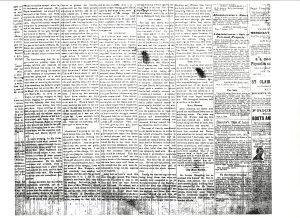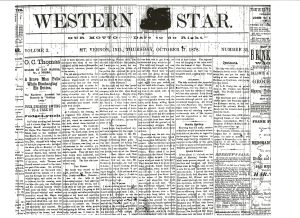Former President Donald Trump is facing both state and federal charges in several courts of law. These charges present difficult challenges to the judges in each case with the most important judicial task being to guarantee that all parties receive a fair trial. However, that duty to the people directly impacted by each case must be carried out without violating the right that our Founders knew to be the right that was essential to guaranteeing all of our rights, Freedom of Speech.
While several of the Founders championed freedom of expression as fundamental to democracy, Benjamin Franklin, a newspaper publisher himself, led the debate:
“Freedom of speech is a pillar of a free government;
When this support is taken away, the Constitution of
a free society is dissolved, and tyranny is erected on its ruins.
Republics derive their strength and vigor from a popular
examination into the action of the magistrates.”
Benjamin Franklin was born in 1706 and was immersed in the printing of politically focused newspapers in Philadelphia when fellow printer John Peter Zenger was prosecuted for libeling British Governor William Cosby in New York City in 1734. Zenger was jailed pending his jury trial but when he was tried the jury acquitted him in spite of the clear violation of the British Colonial law. The jury made up its own mind in spite of an atmosphere of bias from the government.
Currently, some of the judges in Donald Trump’s cases have fashioned gag orders that threaten punishment if Trump says things about the possible evidence, the witnesses, the prosecutors or the judges. The reasons given by the judges for these gag orders all claim they are to protect the parties and witnesses from attempted coercion and to prevent the tainting of any future jury pool. In other words, the judges have no faith that potential jurors can do what judges must do in every case. That is, put aside any irrelevant matters and decide Trump’s cases only on the law and the facts.
As a judge for over forty years I find this lack of confidence in jurors ill founded. Judges decide almost all cases without a jury if there is no plea agreement in criminal cases or no settlement in civil cases. In other words, people have confidence a judge in a criminal case may receive an indictment from a grand jury the judge impaneled or approve a charge brought by a prosecutor and still decide the case. Or, a judge may issue an arrest or search warrant based on in depth out of court statements and then set that information aside and still fairly decide guilt or innocence. If one person, a judge, can do this so can twelve. Of course, statements by parties that threaten physical harm should not be tolerated. However, comments about the evidence, the prosecutor or the judge that offend the judge come with the robe, even if those comments are unfair, unkind and untrue. Just ask John Peter Zenger, Benjamin Franklin, Thomas Jefferson, James Madison, etc., etc.
Jurors can be trusted, just as judges can be, to do their duty. CNN or FOX News can be eliminated from the jury room. The voir dire procedure is designed to exclude potential jurors who cannot do that. Does the legal system occasionally fail and a biased judge or jury render a decision based on pre-trial publicity or emotion? Unfortunately, that happens. But to deny America the vital protection of the First Amendment in an attempt to eliminate human frailty is a fool’s errand and an affront to our Sixth Amendment, Right to Trial by Jury.
Gentle Reader, I would like to share with you one of my own experiences as judge as an example of the public’s faith in the ability of a judge, or jury, to set aside bias and still fairly handle a case. Now, I might not process this case today the way I did a few years ago but I will let you be the judge of what happened then. Anyway, what follows is true, if perhaps, somewhat askew legally.
When I received my honorable discharge from the United States Air Force the only job I could find in Indianapolis, Indiana where I lived with my wife and son was selling P.F. Collier Encyclopedias door-to-door. We only owned one car, a 1956 Ford Fairlane convertible. I really liked that car but we decided we needed a new one so I sold it to a guy I worked with on the basis he would pay me each week. Well, the week after I gave him the keys he disappeared with my car. I did not see him again for twenty-five years when he appeared in my courtroom charged with a home burglary.
I had forgotten his name and he surely did not recognize mine. He and his attorney and the prosecutor had filed a plea recommendation and requested that I approve it based on a pre-sentence report prepared by my probation department. After reading the report I realized this man in front of me had stolen my car. When I confirmed that fact, I told him I would recuse and get him another judge. He said, “Ah, Judge, were you going to take the deal before you remembered who I was?” I said, “Yes”. He said, “Well go ahead.” I said, “No, go out and talk to your attorney”. He did. Then he and his attorney and the prosecutor said, “Judge, we really want you to stay on the case so we can get this done now”. I said, “Okay, but what did you ever do with my car?” He said, “Well, when we got to Oregon it quit running and my wife had me cut off the top and fill it with potting soil then she made a planter out of it.”
Now, I know I had other options but one thing this case showed me was a judge or jury can be fair even when personally offended. So suck it up judges and have faith the jurors will not be any less pure than you.




